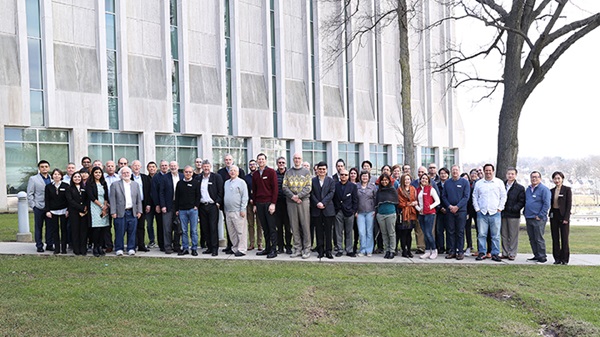CDI and MAVDA Partners Publish Nature Paper on Promising Antiviral
December 20, 2024

A new pathway to inhibit viruses such as SARS-CoV-2 and other deadly pathogens is identified in a new paper in the journal Nature by scientists from The Rockefeller University, the Hackensack Meridian Center for Discovery and Innovation (CDI), and partners who are part of the Metropolitan Antiviral Drug Accelerator (MAVDA) consortium.
The paper “Small-molecule inhibition of SARS-CoV-2 NSP14 RNA cap methyltransferase” was published online in the journal Nature on December 11. The lead author is Thomas Tuschl, Ph.D, of The Rockefeller University, and one of the MAVDA project leaders, and among the other authors is David Perlin, Ph.D., the CDI’s chief scientific officer and executive vice president and MAVDA’s lead co-principal investigator, alongside Nobel Laureate Charles Rice, Ph.D.
The new pathway identified by the paper focuses on targeting methyltransferase enzymes to inhibit RNA viruses. Such enzymes are critical in viral replication, and molecular stability - and also evasion of immune system defenses. This pathway differs from many other antivirals, such as the well-known Paxlovid treatment for COVID-19 infection, which are protease inhibitors that focus on a different family of enzymes entirely.
In the search for methyltransferase inhibitors, Tuschl and his laboratory screened 430,000 compounds, and homed in on a small number of candidates which inhibited the viral cap methyltransferase known as NSP14. From a recent Rockfeller feature on the work:
Those compounds then went through an extensive chemical developmental process to create optimized drug candidates in partnership with the Sanders Tri-Institutional Therapeutics Discovery Institute. Compounds with improved biochemical inhibition were then subjected to cell-based assays conducted by researchers led by Charles M. Rice, who heads the Laboratory of Virology and Infectious Disease at Rockefeller. Finally, colleagues at the Center for Discovery and Innovation in New Jersey then tested the compound in mice under BL3 safety conditions and demonstrated that it could treat COVID-19 on par with Paxlovid. Tuschl and colleagues also demonstrated that the treatment remained effective even if the virus mutated in response to it, and that there was synergy when combined with protease inhibitors.
“Even in isolation, a virus would have trouble escaping this compound,” Tuschl says. “But as a combined therapy along with a protease inhibitor—escape would be almost impossible.”
The work could have implications beyond COVID-19, potentially for other viral pathogens such as Ebola, Zika, and Dengue, among other infections.
Dr. Perlin said it was “the MAVDA consortium’s highly integrated network of science and product development cores, which helped to advance this exciting antiviral candidate.”
"This work, along with other related drug candidates, developed in just two years, demonstrates how a high-performing discovery ecosystem—consisting of academic and industry partnerships—can significantly accelerate the creation of much-needed health solutions," said Dr. Perlin.
MAVDA was founded in 2022, powered by a three-year, $65,141,731 million grant from the NIH and the National Institute of Allergy and Infectious Disease (NIAID). MAVDA is one among the nine Antiviral Drug Discovery (AViDD) Centers for Pathogens of Pandemic Concern program funded by the NIAID, and involves world-class institutions in the New Jersey-New York metropolitan area, and beyond.
MAVDA combines world-class virologists and academic drug development researchers from CDI, Rockefeller University, Columbia University, Princeton University, Yale University, Rutgers University, University of California San Diego, University of Arizona, and Memorial Sloan-Kettering Cancer Center, along with proven antiviral drug developers Merck, the Tri-Institutional Therapeutics Discovery Institute (Tri-I TDI), and Aligos Therapeutics.
Read more from The Rockefeller University newsroom here, and find the Nature publication here.
